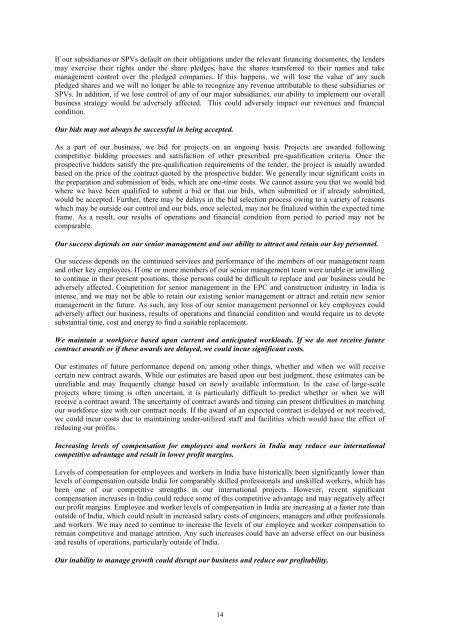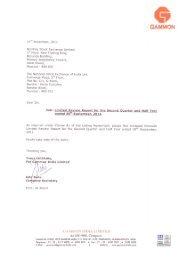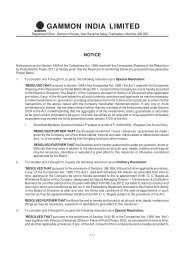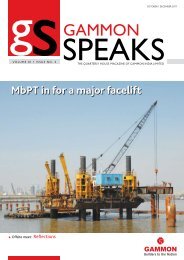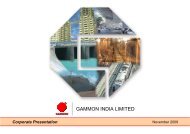GAMMON INDIA LIMITED
GAMMON INDIA LIMITED
GAMMON INDIA LIMITED
You also want an ePaper? Increase the reach of your titles
YUMPU automatically turns print PDFs into web optimized ePapers that Google loves.
If our subsidiaries or SPVs default on their obligations under the relevant financing documents, the lenders<br />
may exercise their rights under the share pledges, have the shares transferred to their names and take<br />
management control over the pledged companies. If this happens, we will lose the value of any such<br />
pledged shares and we will no longer be able to recognize any revenue attributable to these subsidiaries or<br />
SPVs. In addition, if we lose control of any of our major subsidiaries, our ability to implement our overall<br />
business strategy would be adversely affected. This could adversely impact our revenues and financial<br />
condition.<br />
Our bids may not always be successful in being accepted.<br />
As a part of our business, we bid for projects on an ongoing basis. Projects are awarded following<br />
competitive bidding processes and satisfaction of other prescribed pre-qualification criteria. Once the<br />
prospective bidders satisfy the pre-qualification requirements of the tender, the project is usually awarded<br />
based on the price of the contract quoted by the prospective bidder. We generally incur significant costs in<br />
the preparation and submission of bids, which are one-time costs. We cannot assure you that we would bid<br />
where we have been qualified to submit a bid or that our bids, when submitted or if already submitted,<br />
would be accepted. Further, there may be delays in the bid selection process owing to a variety of reasons<br />
which may be outside our control and our bids, once selected, may not be finalized within the expected time<br />
frame. As a result, our results of operations and financial condition from period to period may not be<br />
comparable.<br />
Our success depends on our senior management and our ability to attract and retain our key personnel.<br />
Our success depends on the continued services and performance of the members of our management team<br />
and other key employees. If one or more members of our senior management team were unable or unwilling<br />
to continue in their present positions, those persons could be difficult to replace and our business could be<br />
adversely affected. Competition for senior management in the EPC and construction industry in India is<br />
intense, and we may not be able to retain our existing senior management or attract and retain new senior<br />
management in the future. As such, any loss of our senior management personnel or key employees could<br />
adversely affect our business, results of operations and financial condition and would require us to devote<br />
substantial time, cost and energy to find a suitable replacement.<br />
We maintain a workforce based upon current and anticipated workloads. If we do not receive future<br />
contract awards or if these awards are delayed, we could incur significant costs.<br />
Our estimates of future performance depend on, among other things, whether and when we will receive<br />
certain new contract awards. While our estimates are based upon our best judgment, these estimates can be<br />
unreliable and may frequently change based on newly available information. In the case of large-scale<br />
projects where timing is often uncertain, it is particularly difficult to predict whether or when we will<br />
receive a contract award. The uncertainty of contract awards and timing can present difficulties in matching<br />
our workforce size with our contract needs. If the award of an expected contract is delayed or not received,<br />
we could incur costs due to maintaining under-utilized staff and facilities which would have the effect of<br />
reducing our profits.<br />
Increasing levels of compensation for employees and workers in India may reduce our international<br />
competitive advantage and result in lower profit margins.<br />
Levels of compensation for employees and workers in India have historically been significantly lower than<br />
levels of compensation outside India for comparably skilled professionals and unskilled workers, which has<br />
been one of our competitive strengths in our international projects. However, recent significant<br />
compensation increases in India could reduce some of this competitive advantage and may negatively affect<br />
our profit margins. Employee and worker levels of compensation in India are increasing at a faster rate than<br />
outside of India, which could result in increased salary costs of engineers, managers and other professionals<br />
and workers. We may need to continue to increase the levels of our employee and worker compensation to<br />
remain competitive and manage attrition. Any such increases could have an adverse effect on our business<br />
and results of operations, particularly outside of India.<br />
Our inability to manage growth could disrupt our business and reduce our profitability.<br />
14


